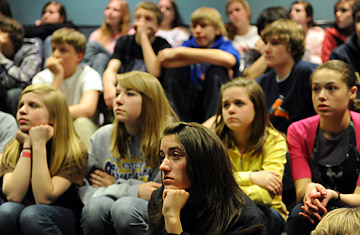
The government of Extremadura in southwestern Spain has launched a sexual-education campaign for teens that includes workshops on masturbation
Between gay marriage, decriminalized abortion and all that pornography on TV, you'd think that the Spanish would be impossible to shock. After all, theirs is a country that in the past couple of decades has not merely evolved from its conservative, Catholic past but has rushed dramatically away from it. But teen masturbation workshops funded with public money? Turns out some Spaniards may not be quite ready for that.
In late October, the regional government of Extremadura in southwestern Spain launched a new sexual-education campaign designed to facilitate the "development of healthy habits, self-esteem and safety." Although the publicly funded campaign includes the publication of pamphlets and an online magazine, the highlight is a series of workshops for 14-to-17-year-olds aimed at educating participants on anatomy, body image, safe-sex practices, gender equality and, in the mildly celebratory words of an early press release (since redacted), "sexual self-exploration and erotic self-knowledge." Or, in other words, masturbation.
It was this last element that attracted attention across the country. "Masturbation Workshops for Adolescents," ran the headline in Que!, a free daily in Madrid. "Extremadura Promotes Masturbation," cried the centrist national paper El Mundo. Criticizing the spending as frivolous, especially during a recession, the Catalan paper La Vanguardia sniped, "Extremadura's youth may have the highest rates of unemployment, but they'll be the best masturbators."
The media weren't the only ones complaining. In fact, to judge by the outraged response among Spaniards, it was as if government officials themselves were giving hands-on lessons. Luis Alfonso Hernández Carrón, spokesman for the opposition Popular Party in Extremadura, said the classes were "an attack on the intelligence of young people" and lamented that the region was becoming "the laughingstock of Spain."
For Mercedes Coloma, president of the Madrid-based Confederation of Parents of Students, the problem lies less with the content than with who is distributing it. "This is a clear usurpation of parents' rights," she says. "In their publicity, [the government] talks about creating a space for exchange and dialogue about sex. But that space already exists: it's the family."
But proponents of the program defend it as a much-needed means of promoting healthy sexuality and egalitarian relationships among teenagers. Laura Garrido, president of the Extremadura Youth Council and one of the officials behind the campaign, is surprised and disappointed by the outcry. "What we're talking about is whether we teach them to have healthy relationships or not, whether they have self-esteem or not, whether they know how to say 'yes' or 'no' at a given time," she says.
Admittedly, Garrido and the other organizers bear more than a little responsibility for the response. They're the ones, after all, who chose the instructors to lead the workshops: two women who, in addition to running sex-education workshops, co-own a shop in Madrid called Lola's Pleasures, which specializes in erotic devices. The instructors, who have given adult sex-education classes sponsored by municipal governments in other regions of the country, didn't help matters by bringing a selection of sex toys to the first teen workshop in late October in order "to dispel myths," Garrido says.
And then there is the campaign's name. Intended to encourage young people to be in control of their sexuality, it instead suggested a more, um, singular purpose: Pleasure Is in Your Hands. "The title might have been a mistake," says Raquel Traba, one of the instructors. "But I think it also has to do with politics. It's a way of attacking progressive attitudes. There's still a lot of backward thinking about sex in this country."
In fact, Spain is among the minority of European Union member states that do not require sexual education in schools. And in comparison to what gets taught in other Western European nations, the material in the Extremadura program hardly seems radical. In the Netherlands, for instance, teachers at public schools lead discussions in which they ask girls ages 12 to 15 what they would do if their boyfriends refused to wear a condom. In Finland, basic sex education begins in kindergarten, and the curriculum for ninth-graders includes lessons on abortion and masturbation. In Germany, where sex education is mandatory, public school teachers have been known to discuss oral sex and different sexual positions. And in Britain, the National Health Service responded to the country's burgeoning rates of teen pregnancy this past summer by launching an awareness campaign called "One Orgasm a Day" that sought to steer young people away from intercourse and toward masturbation. (Admittedly, that one got a lot of attention.)
The controversy sparked by the Extremadura program is a vivid reminder of how new all this sexual openness is in Spain. Which may be why, when asked at a news conference on Nov. 12 why sex toys were included in the lesson, Garrido sounded a little shell-shocked as she replied, "I thought we were in the 21st century."
